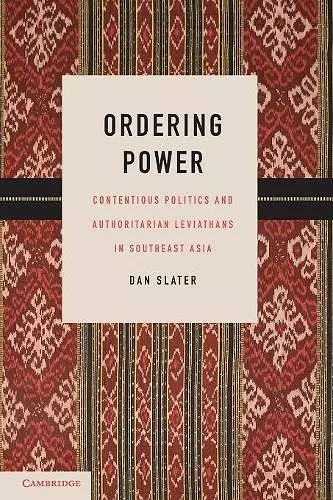Ordering Power
Contentious Politics and Authoritarian Leviathans in Southeast Asia
Format:Paperback
Publisher:Cambridge University Press
Published:9th Aug '10
Currently unavailable, and unfortunately no date known when it will be back
This paperback is available in another edition too:
- Hardback£74.99(9780521190411)

Ordering Power draws on theoretical insights to develop a unified framework for explaining the tremendous variation in state capacity and authoritarian durability in Southeast Asia.
Ordering Power draws on theoretical insights dating back to Thomas Hobbes to develop a unified framework for explaining the tremendous variation in state capacity and authoritarian durability in Southeast Asia.Like the postcolonial world more generally, Southeast Asia exhibits tremendous variation in state capacity and authoritarian durability. Ordering Power draws on theoretical insights dating back to Thomas Hobbes to develop a unified framework for explaining both of these political outcomes. States are especially strong and dictatorships especially durable when they have their origins in 'protection pacts': broad elite coalitions unified by shared support for heightened state power and tightened authoritarian controls as bulwarks against especially threatening and challenging types of contentious politics. These coalitions provide the elite collective action underpinning strong states, robust ruling parties, cohesive militaries, and durable authoritarian regimes - all at the same time. Comparative-historical analysis of seven Southeast Asian countries (Burma, Indonesia, Malaysia, the Philippines, Singapore, South Vietnam, and Thailand) reveals that subtly divergent patterns of contentious politics after World War II provide the best explanation for the dramatic divergence in Southeast Asia's contemporary states and regimes.
'Three cheers for Dan Slater! One for showing that elite opposition to democracy has taken quite different forms in Southeast Asia. Another for revealing how different kinds of counterrevolutionary politics have been a response to different types of political challenges. And the third for demonstrating how comparative-historical analysis can brightly illuminate just these kinds of large and consequential processes. All serious students of state formation and democratization will want to read Ordering Power.' Jeff Goodwin, New York University
'Ordering Power is one of the most important books on either political regimes or state-building to be published in the last two decades. Though focused on Southeast Asia, the book will be required reading for all students of democratization and state-building. Slater brings the state back into contemporary regime analyses, showing why state infrastructural power is critical to authoritarian stability. Based on impressive historical analysis, the book explores the roots of state power in Southeast Asia. Whereas much previous work on state-building focused on external military conflict, the book shows how internal conflict - and specifically, early periods of mass mobilization and communal conflict - may induce elites to enter a protection pact that can serve as a foundation for long-term authoritarian stability. Of the many recent studies of the sources of authoritarian stability, I find Ordering Power to be most compelling.' Steven Levitsky, Harvard University
'Ordering Power tackles big questions in a powerful and nuanced way, connecting to a broad range of important debates. Dan Slater has produced an extremely powerful and important book that will be of considerable interest to a wide-ranging audience in the social sciences, history, and Southeast Asian studies.' T. J. Pempel, University of California, Berkeley
'With the publication of Ordering Power, Dan Slater has demonstrated with impressive skill and sophistication the importance of social forces and conflicts for underpinning authoritarian rule, in Southeast Asia and beyond, as well as the broader intellectual promise of an approach to comparative politics rooted in the tradition of comparative historical sociology. Slater has singlehandedly raised the standards - and the stakes - of cross-national comparative analysis of Southeast Asian politics. It is to be hoped that serious scholars of the region will rise to the challenge of engaging with his work.' John T. Sidel, London School of Economics and Political Science
ISBN: 9780521165457
Dimensions: 234mm x 156mm x 20mm
Weight: 500g
346 pages